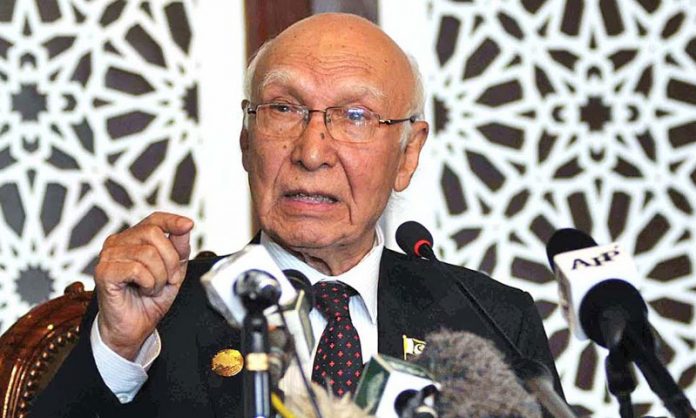ISLAMABAD: Adviser to the Prime Minister on Foreign Affairs, Sartaj Aziz has called upon the international community and India to fulfill promises made to Jammu & Kashmir people for exercise of their inalienable right to self-determination through a free and impartial plebiscite under the auspices of the United Nations.
Addressing International Parliamentary Seminar on Jammu and Kashmir on Thursday, he said that Pakistan is utilizing all possible avenues to project the cause of Kashmir and to find its lasting settlement in accordance with the wishes of the people.
“Let there be no doubt that Pakistan will continue to extend its steadfast support to the Kashmiri people,” he asserted.
Pakistan is committed to extending all moral, political and diplomatic support to the people of Jammu and Kashmir in their historic struggle for their right to self-determination, he said.

The moot was opened by Prime Minister Muhammad Nawaz Sharif and was attended, among others, by Speaker National Assembly, Sardar Ayaz Sadiq, Minister for Defence, Khawaja Asif, President of Azad Jammu and Kashmir, Masood Khan and Prime Minister of AJK, Raja Farooq Haider.
Sartaj Aziz stressed that the UN Security Council Resolutions on Jammu & Kashmir offer the only plausible, peaceful and democratic solution to the Jammu & Kashmir dispute.
The Kashmir dispute remains the core issue between India and Pakistan, he said. Prime Minister Nawaz Sharif in the United Nations General Assembly last September had said “Peace and normalization between Pakistan and India cannot be achieved without a resolution of the Kashmir dispute. This is an objective evaluation, not a partisan position”, he quoted.
A deeply worrying aspect of Indian actions in Indian Occupied Kashmir (IoK) is the attempt to change the demography of Kashmir and convert its Muslim majority into a minority, he said. Recent reports of issuance of Kashmiri citizenship to non-state subjects, have led to protests and clashes in the IoK, he added.
“Equally disturbing are reports of extension of SARFAESI Act to IoK, whereby Indian Banks can seize property of Kashmiri people and sell them to non-state subjects.”
Adviser to the Prime Minister on Foreign Affairs, Sartaj Aziz said, “We condemn such measures as complete violation of international law and United Nations Security Council Resolutions and call upon India to desist from taking any action that could alter the demography of IoK.
He said July 8, 2016, which marks the extra judicial murder of young Kashmiri leader Burhan Wani at the hands of Indian occupying forces has proven to be a pivotal turning point for the Kashmir freedom movement.
200,000 people who attended his funeral inspired the entire population of IoK to recalibrate their march towards Azadi, despite a reign of terror unleashed by Indian occupation forces.
Since then, he said, Indian forces have used live ammunition and pellet guns on the unarmed Kashmiri civilians with impunity, leading to scores of deaths and injuries.
Due to pellet injuries, thousands of people have sustained severe eye injuries, leading to partial or permanent blindness, he added.
“There was unanimity, even in India that the present wave of uprising is indigenous and cannot be brought under the convenient label of so called “cross border terrorism”, he said.
Former Indian NSA M. K Narayanan wrote in The Hindu on October 10, 2016 that Kashmir freedom movement is “home grown and cannot be blamed on Pakistan or outsiders”.
Sartaj Aziz pointed out that the educated and tech savvy youth of Kashmir were leading this uprising.
This new leadership was effectively using social media and information technology in a peaceful manner.
The Indian Express notes that “a new generation”, mostly from prosperous families, is increasingly taking centre stage of the Kashmiri uprising, he noted.
The movement, he said, has sustained itself for five long months, despite unprecedented coercion by Indian forces. The “protest calendar” issued by Hurriyat leadership is earnestly followed with constant ‘Hartals’ (shut downs) and boycotts, he added.
There is growing realization in India on the nature and the scale of draconian measures adopted by the Indian government in IoK, he said adding that pictures of blinded youth have touched everyone.
He quoted one Indian expert who termed it “extreme suppression of civil liberties”, which has united Kashmiri public as” nothing unites people like shared persecution”.
Another notes that “each death, of a protestor, has become a celebration of this defiance, triggering more protests, adding more grievances and increasing the alienation” of India, he added.
President Azad Jammu and Kashmir Masood Khan and Prime Minister Raja Farooq Haider and Defence Minister Khwaja Asif were among the participants of International Seminar that gathered scholars on Kashmir from Europe and North America.
Adviser to Prime Minister on Foreign Affairs Sartaj Aziz said Jammu and Kashmir remained a core issue between Pakistan and India and was also the longest unresolved item along with Palestine issue on the UN agenda.
He said three successive generations of Kashmiris had been struggling for their right to self-determination in 70 years despite harshest measures taken against them by India.
He said the Kashmir movement was indigenous and could not be equated with terrorism.
He mentioned that funeral of Burhan Wani was attended by 200,000 people and the movement was sustained for five-long months despite Indian pressure.
Aziz pointed that the ratio of Indian security personnel in Jammu and Kashmir were far larger than civilians and said there was a growing realization even in India about the treatment being meted out to Kashmiris.
He also mentioned as disturbing the reports of India seizing property and freezing bank accounts of some Kashmiris.
Speaker National Assembly Sardar Ayaz Sadiq in his speech said the parliament had passed over a dozen resolutions in support of Kashmiris.
He said Kashmiris were facing the brutalities of genocide, detentions, murders and fake encounters and mentioned that more than 6,000 people in the Valley suffered pellet gun injuries.
He said Kashmir remained a bone of contention between Pakistan and India, adding that the latter had been disproportionately spending on defence.





